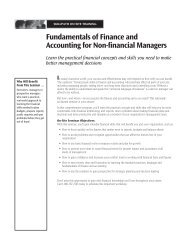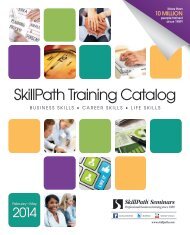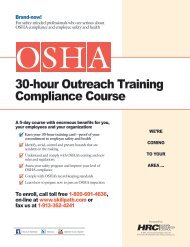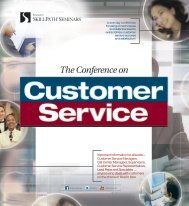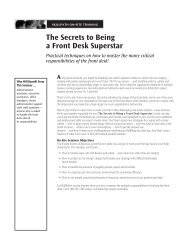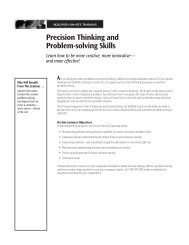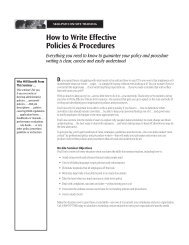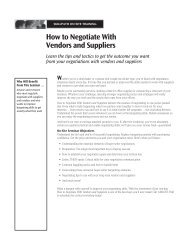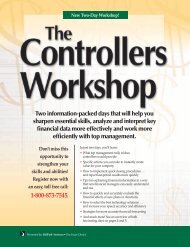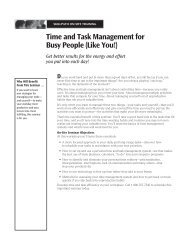Download brochure PDF - SkillPath | Seminars
Download brochure PDF - SkillPath | Seminars
Download brochure PDF - SkillPath | Seminars
Create successful ePaper yourself
Turn your PDF publications into a flip-book with our unique Google optimized e-Paper software.
• 2 critical factors for getting team members to accept change<br />
• How to use delegation to push team members to take action<br />
and get results<br />
• Understanding the single most important function of the<br />
team leader<br />
• Understanding when to “coach” and when to “direct” in order<br />
to elicit the best performance from team members<br />
Tuning in to critical communication cues<br />
• The 4 components of effective communication<br />
• 8 tips for helping team members communicate better with<br />
each other, with customers and with you<br />
• How to get team members to listen to and accept criticism<br />
from one another<br />
• The common barriers to effective listening and how<br />
to overcome them to strengthen relationships among<br />
team members<br />
• How to help team members understand the difference<br />
between “acceptance” and “agreement”<br />
• 6 benefits of asking good questions—and the 5 types of<br />
questions to avoid<br />
Day two<br />
9 a.m. to 4 p.m.<br />
Dealing with performance problems<br />
• Understanding the 3 major types of problems that keep team<br />
members from performing at their peak—and the specific<br />
actions you can take to counter each type<br />
• A sure-fire approach for getting team members who choose<br />
not to perform to not only change but to grow<br />
• How to determine when additional training is needed to<br />
smooth out rough spots in performance<br />
• 4 critical steps to making sure your discipline sticks<br />
• How to conduct an effective performance review<br />
• How to deal with “eager beavers” who don’t produce<br />
• A dozen key areas to examine when the team as a whole is<br />
experiencing performance problems<br />
Shared problem solving<br />
and decision making<br />
• The 3 primary problem-solving and decision-making styles<br />
most teams utilize—and the pros and cons of each<br />
• The team leader’s role in the rational problem-solving process<br />
• How to use brainstorming as a tool for encouraging the free<br />
exchange of ideas and solutions<br />
• Avoid conflict and controversy with this proven technique<br />
for making choices when several excellent alternatives are on<br />
the table<br />
• How to gain cooperation when some team members won’t<br />
abide by the decisions made by the team as a whole<br />
• How to get your team to make decisions when team members<br />
want to be told what to do<br />
• The top 10 factors that influence a team’s<br />
decision-making process<br />
Dealing with team conflict<br />
• The key to promoting team harmony and<br />
minimizing disagreements<br />
• Why you can’t sweep team conflict under the rug<br />
• Proven methods for structuring and conducting successful<br />
conflict-resolution meetings<br />
• A 10-step disciplinary process that addresses misconduct<br />
openly and frankly<br />
• The 5 levels of team conflict and what you can do to help<br />
mitigate the factors that cause them<br />
• 10 conflict-avoidance tips team leaders can practice in any<br />
team situation<br />
• How to deal with team members who spend more time<br />
competing with each other than cooperating<br />
• The 3 ways teams commonly mishandle anger—and how to<br />
help team members redirect it<br />
Conducting effective team meetings<br />
• Why the time you spend planning and preparing for a<br />
meeting is as important as the meeting itself<br />
• 5 key elements of an effective meeting agenda<br />
• 10 tips for leading purposeful, productive team meetings<br />
• How to create an environment that encourages team<br />
members—even untalkative ones—to fully participate<br />
in the exchange of ideas<br />
• 2 dozen techniques experienced team leaders use to keep<br />
discussions flowing during meetings<br />
• Facilitation techniques for ensuring that team meetings run<br />
smoothly—and which behaviors to avoid<br />
• The “100-mile rule”: How to use it to eliminate distractions<br />
and keep team members focused on the business at hand<br />
Managing virtual teams<br />
• Understanding how virtual teams have revolutionized<br />
the workplace<br />
• The 3 phases of planning and development necessary for<br />
creating a winning virtual team<br />
• The essential skills and technology needed to support an<br />
effective virtual team<br />
• Understanding and supporting the dynamics of teams that<br />
reach across organizations<br />
• How to enhance personal communications when team<br />
members meet electronically<br />
• One of the key reasons virtual teams fail—and<br />
commonsense approaches to prevent it<br />
IT’S EASY<br />
TO ENROLL<br />
© On-line: Enroll on-line at<br />
www.skillpath.com<br />
© By Phone: 1-800-873-7545<br />
© By E-mail: enroll@skillpath.com<br />
Please include: Name and mailing address, session you wish<br />
to attend, your VIP number as it appears on your mailing<br />
label, approving manager and billing information<br />
© By Mail or Fax:<br />
<strong>SkillPath</strong> <strong>Seminars</strong><br />
P.O. Box 804441<br />
Kansas City, MO 64180-4441<br />
Fax: 1-913-362-4241<br />
Build teamwork that gets<br />
bottom-line results—enroll now!<br />
Cancellations and substitutions. Cancellations<br />
received up to five working days before the<br />
seminar are refundable, minus a $25 registration<br />
service charge. After that, cancellations are<br />
subject to the entire seminar fee, which you may<br />
apply toward a future seminar. Please note that<br />
if you don’t cancel and don’t attend, you are still<br />
responsible for payment. Substitutions may be<br />
made at any time.



